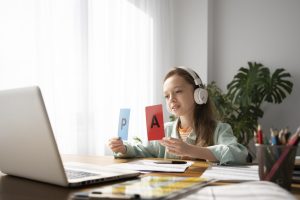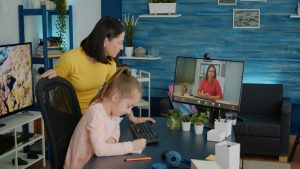Contents
Online education’s popularity increases. Parents move their children to online learning because it is a safe and flexible option. This method of education works well for children with disabilities.

Virtual special education classes are a form of education modified to meet the individual needs of the students with disabilities. The focus of these classes is on accessibility. Lessons adapt to meet the different needs of students. Let’s see virtual special education classes in detail.
Why to Choose Virtual Special Education Classes?
|
Parents, Take Note
The study “Motivations Among Special Education Students and Their Parents for Switching to an Online School” was conducted by DeLaina Tonks, Royce Kimmonsand and Stacie L. Mason. Results showed 73% of the students had problems at their previous schools related to bullying, interaction with teachers, or studies and disability and health problems. Five students reported they had faced bullying and an escape in virtual education
|
Virtual special education classes offer a customized learning environment for students with disabilities. These classes provide a safe and accessible platform where students receive individual support and instruction. Virtual special education focuses on each student’s specific needs. This method supports effective learning from home and makes it a strong choice for families seeking specialized education.
Learn more about online schooling for special needs students here.
Benefits of Virtual Special Education Classes
Virtual special education classes have several advantages. These advantages let students with disabilities be successful in this kind of virtual learning environment.

Personalized Instructions
Virtual special education classes provide lessons customized to each student’s learning needs. Teachers modified the curriculum for meeting the various learning styles. Educators provide students with the assistance they need, regardless of the challenges children face. These challenges include behavioral issues, difficulty recognizing words, and other learning obstacles. This personalized approach helps students in those areas where they lag behind.
Safe Learning Environment
Students benefit from a safe and controlled learning space in a virtual setting. Children do not face social issues like bullying or peer pressure in the virtual classroom. Students are in a position where they concentrate on their education without any interference. Parents stay close to students who need extra support. Families guide children through challenges and help them stay focused.
Accessibility
Virtual special education classes include accessibility tools like text-to-speech programs, screen readers, and adaptable content formats. These tools help students with physical, cognitive, or sensory disabilities fully participate in lessons. This setup allows students to work with the material at their ability level. The tools remove barriers present in a physical classroom.
Read more about the resources for special needs students here.
One-on-One Support
Virtual special education programs offer direct interaction between teachers and students. This personalized attention lets teachers focus on each student’s unique challenges. It allows educators to give immediate feedback and guide students more effectively. One-on-one support provides students with the guidance they need. This helps improve students’ understanding and leads to academic success.
Reduced Sensory Overload
Virtual classrooms offer comfort to students with sensory sensitivity. The classrooms eliminate the use of any distractions, including loud noise, bright lights, or crowding. This helps reduce anxiety and allows students to focus on their lessons more constructively.
Work with Specialists
Virtual special education classes provide the opportunity for involvement by specialists like speech therapists, occupational therapists, and behavioral counselors.
How Do Virtual Special Education Classes Work?
Virtual special education classes bring interactive lessons directly to students in the comfort of their homes. Teachers offer customized learning for the students by means of video conferencing, available interactive tools, and software. Each student gets one-on-one support and customized instruction with speech or occupational therapy resources. Students with disabilities participate in their education in the most comfortable manner. Here’s how it works:
- Parents enroll the child in the program. An Individualized Education Plan (IEP) meeting follows to set specific goals and strategies for the student
- Parents set up devices like computers or tablets. Families learn to navigate the platform and its resources
- Students join live video lessons with teachers. Children complete self-paced assignments between sessions
- Teachers provide one-on-one support. Therapists offer services like speech or occupational therapy through teletherapy
- Progress is tracked through regular assessments. The learning plan is adjusted as needed
- Teachers share a progress report with parents. The IEP is updated for the next term if necessary
What Should Parents Consider?

Parents consider several key factors when enrolling a child with special needs in virtual special education classes. These factors help understand if the program supports their child’s learning and development:
- Access to the internet and necessary devices like a computer or tablet. The right tools help children participate fully in virtual lessons
- The program provides access to specialists like speech or occupational therapists. These services are part of the learning experience
- Virtual classes offer personalized lessons tailored to childrens’ needs. The program adapts to childrens’ strengths and areas of improvement
- Involvement in virtual special education. Parents assist with lessons, schedules, and communication with teachers
- The program supports social interaction. Check if group activities or virtual meetups with classmates are included
- Children adapt well to learning from home. Parents consider how the virtual environment affects their child’s comfort and stress levels
- Regular assessments help track children’s progress. Parents ask if they will receive updates on their child’s development from teachers
- The program offers strong overall support. Families check if technical help, teacher communication, and specialist access are available
Virtual Special Education Classes at Legacy Online School
“I have found the working environment good for my professional development as well as my mental health as the work environment is so friendly, fit for one to grow in all angles while leading a healthy mental state”
Student’s review, Trustpilot

Legacy Online School offers a comprehensive virtual learning environment. Our school provides a variety of resources and support for students. The school uses advanced tools and methods to create an inclusive experience. Every student has access to quality education through this platform.
Teachers at Legacy Online School use their knowledge and interactive tools to involve students in the learning process. This helps create personalized learning for each student.
Legacy Online School offers different learning formats, such as group sessions, one-on-one meetings with teachers, and self-paced study. The one-on-one live teaching format provides personalized attention, with dedicated sessions between a student and a teacher to focus on individual learning needs. These options allow students to learn at their own speed or take part in structured group lessons.
Learn more about Legacy Online School’s support of special needs students here.
Conclusion
Virtual special education classes provide customized learning materials and support tailored to the needs of students with disabilities. The classes create a safe, accessible, and adaptable learning environment, helping students succeed academically. Our team explored the information about special education classes. This information will help in choosing the best virtual education option for children.











